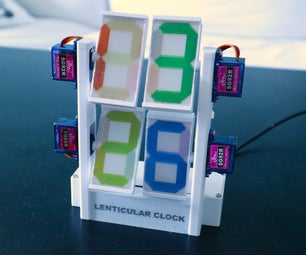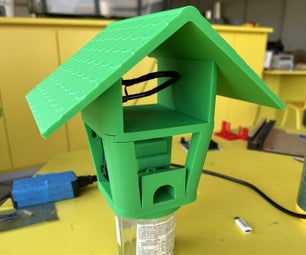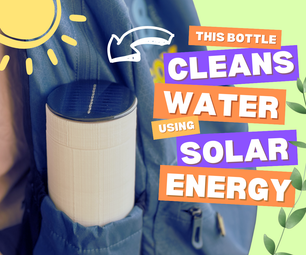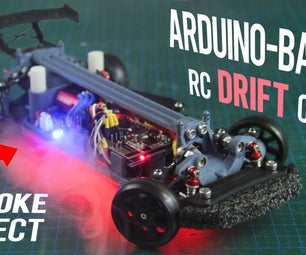Introduction: Making a Home Laboratory for Fun Projects - Detailed Guide -
Hi,
I am an electronics and robotics passionate, i am studying embedded systems and to make things fun i built my DIY home laboratory to do experiences and to push some little research based on curiosity and passion.
Starting from this instructable. we are going to discover how to build a fully functional home Laboratory to do all of your DIY projects and especially projects in relation with electronics and robotics.
A series of tutorials will be made in order to finish our Low cost DIY Lab
- Basics for a home Laboratory
- Tools/gadgets to make at home (Low cost) : DIY Power Supply
- Tools/gadgets to make at home (Low cost) : DIY Air Absorber
Extras for Robotics
- Batteries (types and uses)
- DIY Battery pack for mobile applications
- DIY Battery charger
- DIY Battery Spot Welder
Extras for Computer vision
- Kinect basic
- using OpenCV for Python on Raspberry Pi3
Extras for Embedded systems projects
- Microcontrollers
- From amateur to professional (Starting with STM32)
- Designing Circuit Boards
Step 1: -- Basics for a Home Laboratory (Tools)
When i was trying to set up my own laboratory, i just started by doing projects and each time i need a specific tool, i go and buy it. the problem here is that most of the time i have to wait for days to get what i want or i had to buy it expensive just to finish the project on time. To avoid that struggle i started making a list of necessary component that are commonly used in projects, and just hunt them whenever i got a chance to find cheap ones.
i used the content of some available tutorials tackling this subject but I tried to gather only the necessary and basic tools that each electronic hobbyist should have.
I tried to gather some kits that i find practical and economic, and also to serve as examples.
1- The placement :
It would be better if you have a spare room to have enough space for big projects. but if not, just a good bench well set up, in the corner of you room (like mine) would do the job.
2- Put your Desk (workbench) against the wall near a power plug and get some power strips.
3- Get a good lighting : you can buy a good Fluorescent light bulb or a White Bright LED Strip.
4- get some plastic boxes/Storage cabinets (multiple sizes) for arranging components
5- get a peg board for space optimization
you can get inspiration from this video :
Gadgets/Tools :
1- A set of cutters and pliers : Cutter/Pliers pack
2- A decent multimeter, preferably 2 : to use one for Voltage and the second for current measurements: MUSTOOL MT108T . some new multimeters can also measure temperature
3- Soldering iron : preferably a decent soldering station.
4- Hot air for some advanced usage (there are soldering station containing hot air)
5- Desoldering pump
6- Solder (standard 60/40 multicore, use thin solders with less than 0.5mm diameter. Solder spool stand and multicore solder wick is also recommended)
7- Flux Pen
Some Soldering kits you can buy :
Package kits : Saike soldering station+ DC Power supply ; soldering kit : DANIU ; Portable kit : Soldering+Multimeter
8- Hot Glue Gun
9- Shrinking tubes/ Electric tape : Kit for isolation
10- Different sizes and types of screw drivers : DANIU ; Raitool
11- Bread board with pre-shaped jumper wires&some alligator cables(a main big one and some small ones for portable projects) link
12- Strip board.
13- Engineering ruler/digital vernier caliper : Practical low cast Caliper
14- tweezers
15- Power sources :
As a beginner it is easy to use old phone chargers (5v DC) or different types of charger that you can get from old machines, you can find mostly 12V DC and 5 V DC.. Or just use a Power supply from an old Computer (3.3v - 12v - 5v)
As you get into advanced projects and experiences you're going to need specific voltages. An appropriate Power Supply is what you need, like this one link, or you can enjoy making one with different personalized options on our next tutorial.
16- Fume extractor : you can get one in order to protect yourself from the soldering fume link or just use a computer fan as i'll be presenting in another tutorial.
17- an Oscilloscope 20Mhz dual channel would be good and not expensive: you can get the oscilloscope as you get advanced in your projects.
Step 2: -- Basics for a Home Laboratory (Components)
Basic components to put into you cabinets :D, and some kits you can get as examples:
1- Resistors in different values (1/4 W) : Kit1 or Kit2 would be good
2- Capacitors in different basic values for digital applications, Kit1 ; Kit2
3- Potentiometers in different values: Kit and Kit2
4- LEDs in different colors : Kit1
5-Rectifier Diodes : Kit1 ; Zener
6- Transistors : a variety of them to match most of the application we might do (BC547 , 2N2222A, IRFZ44N, Kit1)
7- LDRs for light sensing : Link
9- 5V Relays : link
10- Timer NE555
11- Op Amps TL072
12- 5V Regulators L7805
13- Power jacks male and female : They are extremely useful for portable projects
14- DC motors (5v .. ) you can get from old CD reader
15- Stepper motor : you can also get them from CD readers
16- a microcontroller: Arduino Uno or Nano
17- Some sensors : Ultrasonic, infrared, Bluetooth ...
There are lot of kits when it comes to arduino you just chose whatever suits you the best depending on your budget and the projects you intend to do : Kit1
18- Retrieving components from old circuit boards and machines is a useful and cheap way to expend you laboratory. and learn how things are made.
Step 3: -- Basics for a Home Laboratory (Bonus)
As part of being an electronics/robotics fan, you are required to build your components/objects by yourself using various types of materials and tools to finish the mechanical part.
Basic material :
- Get some Wood/hard cardboard.
- Plexiglass is also an alternative for a nice and good looking project
- Forex : for fast prototyping
Basic tools
- Mini Drill machine (for PCBs and finishing touch)
- Drill machine to make holes in a definite diameter
Electric Jigsaw
Get protection gloves ans goggles
i hope you like this first instructable, i'll be glad to read your comments or suggestions concerning both the topics or the basics of a home laboratory










